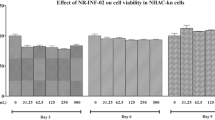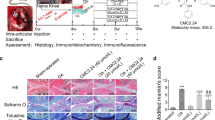Abstract
A complex of curcumin and lecithin developed to improve the solubility of curcumin, enhanced its chondroprotective effect via an anti-inflammatory mechanism. In macrophage, proinflammatory cytokines, such as tumor necrosis factor (TNF)-α, interleukin (IL)-1β, IL-6, prostaglandin E2 (PGE2), and nitric oxide (NO) were quantified. In addition, the activity of nuclear factor (NF)-κB was examined. With chondrocytes, inflammatory mediators were assessed by measuring the secretion levels of IL-6, IL-8, and PGE2, also the mRNA expression of cyclooxygenase-2 (COX-2) and inducible nitric oxide synthase (iNOS). Metalloproteinases (MMPs), tissue inhibitor of metalloprotease (TIMP)-1, type II collagen (COL2), proteoglycan (PG), and hyaluronic acid (HA) were measured with respect to the articulation surface. The complex promoted the anti-inflammatory effect by the inhibition of inflammatory mediators. In addition, mRNA expression levels ameliorated. Furthermore, it was effective in decreasing extracellular secretion of polypeptides, also corresponding intracellular MMPs and TIMP-1. In conclusion, the complex may be developed as a functional supplement to maintain articulation health.




Similar content being viewed by others
References
Anand P, Kunnumakkara AB, Newman RA, Aggarwal BB. Bioavailability of curcumin: Problems and promises. Mol. Pharm. 4: 807–818 (2007)
Appendino G, Belcaro G, Cornelli U, Luzzi R, Togni S, Dugall M, Cesarone MR, Feragalli B, Ippolito E, Errichi BM, Pellegrini L, Ledda A, Ricci A, Bavera P, Hosoi M, Stuard S, Corsi M, Errichi S, Gizzi G. Potential role of curcumin phytosome (Meriva) in controlling the evolution of diabetic microangiopathy. A pilot study. Panminerva Med. 53: 43–49 (2011)
Belcaro G, Cesarone MR, Cornelli U, Pellegini L, Ledda A, Grossi MG, Dugall M, Ruffni I, Fano F, Ricci A, Stuard S, Luzzi R, Grossi MG, Hosoi M. Prevention of flu episodes with colostrum and Bifivir compared with vaccination: an epidemiological, registry study. Panminerva. Med. 52: 269–275 (2010)
Ben PL, Liu JH, Lu CY, Xu YM, Xin YQ, Fu J, Huang HA, Zhang ZP, Gao YH, Luo L, Yin ZM. Curcumin promotes degradation of inducible nitric oxide synthase and suppresses its enzyme activity in RAW 264.7 cells. Int. Immunopharmacol. 11: 179–186 (2011)
Billinghurst RC, Dahlberg L, Ionescu M, Reiner A, Bourne R, Rorabeck C, Mitchell P, Hambor J, Diekmann O, Tschesche H, Chen J, VanWart H, Poole AR. Enhanced cleavage of type II collagen by collagenases in osteoarthritic articular cartilage. J. Clin. Invest. 99: 1534–1545 (1997)
Bundy R, Walker AF, Middleton RW, Booth J. Turmeric extract may improve irritable bowel syndrome symptomology in otherwise healthy adults: A pilot study. J. Altern. Complement. Med. 10: 1015–1018 (2004)
Chen CC. Signal transduction pathways of inflammatory gene expressions and therapeutic implications. Curr. Pharm. Des. 12: 3497–3508 (2006)
Clutterbuck AL, Allaway D, Harris P, Mobasheri A. Curcumin reduces prostaglandin E2, matrix metalloproteinase-3 and proteoglycan release in the secretome of interleukin 1beta-treated articular cartilage. F1000 Res. 2: 147 (2013)
Clutterbuck AL, Mobasheri A, Shakibaei M, Allaway D, Harris P. Interleukin-1beta-induced extracellular matrix degradation and glycosaminoglycan release is inhibited by curcumin in an explant model of cartilage inflammation. Ann. N Y Acad. Sci. 1171: 428–435 (2009)
Comblain F, Sanchez C, Lesponne I, Balligand M, Serisier S, Henrotin Y. Curcuminoids Extract, Hydrolyzed Collagen and Green Tea Extract Synergically Inhibit Inflammatory and Catabolic Mediator’s Synthesis by Normal Bovine and Osteoarthritic Human Chondrocytes in Monolayer. PLoS One. 10 (2015)
Farinacci M, Gaspardo B, Colitti M, Stefanon B. Dietary administration of Curcumin modifies transcriptional profile of genes involved in inflammatory cascade in horse leukocytes. Ital. J. Anim. Sci. 8: 84–86 (2009)
Garcea G, Jones DJL, Singh R, Dennison AR, Farmer PB, Sharma RA, Steward WP, Gescher AJ, Berry DP. Detection of curcumin and its metabolites in hepatic tissue and portal blood of patients following oral administration. Br. J. Cancer. 90: 1011–1015 (2004)
Goggs R, Carter SD, Schulze-Tanzil G, Shakibaei M, Mobasheri A. Apoptosis and the loss of chondrocyte survival signals contribute to articular cartilage degradation in osteoarthritis. Vet. J. 166: 140–158 (2003)
Hanai H, Iida T, Takeuchi K, Watanabe F, Maruyama Y, Andoh A, Tsujikawa T, Fujiyama Y, Mitsuyama K, Sata M, Yamada M, Iwaoka Y, Kanke K, Hiraishi H, Hirayama K, Arai H, Yoshii S, Uchijima M, Nagata T, Koide Y. Curcumin maintenance therapy for ulcerative colitis: Randomized, multicenter, double-blind, placebo-controlled trial. Clin. Gastroenterol. Hepatol. 4: 1502–1506 (2006)
Holt PR, Katz S, Kirshoff R. Curcumin therapy in inflammatory bowel disease: A pilot study. Dig. Dis. Sci. 50: 2191–2193 (2005)
Jackson JK, Higo T, Hunter WL, Burt HM. The antioxidants curcumin and quercetin inhibit inflammatory processes associated with arthritis. Inflamm. Res. 55: 168–175 (2006)
Kim SJ. Curcumin suppresses the production of interleukin-6 in Prevotella intermedia lipopolysaccharide-activated RAW 264.7 cells. J. Periodontal. Implant. Sci. 41: 157–163 (2011)
Lianxu C, Hongti J, Changlong Y. NF-kappa Bp65-specific siRNA inhibits expression of genes of COX-2, NOS-2 and MMP-9 in rat IL-1 beta-induced and TNF-alpha-induced chondrocytes. Osteoarthritis Cartilage. 14: 367–376 (2006)
Mahran RI, Hagras MM, Sun D, Brenner DE. Bringing curcumin to the clinic in cancer prevention: A review of strategies to enhance bioavailability and efficacy. AAPS J. 19: 54–81 (2017)
Malemud CJ. Cytokines as therapeutic targets for osteoarthritis. Biodrugs. 18: 23–35 (2004)
Marczylo TH, Verschoyle RD, Cooke DN, Morazzoni P, Steward WP, Gescher AJ. Comparison of systemic availability of curcumin with that of curcumin formulated with phosphatidylcholine. Cancer. Chemother. Pharmacol. 60: 171–177 (2007)
Mathy-Hartert M, Jacquemond-Collet I, Priem F, Sanchez C, Lambert C, Henrotin Y. Curcumin inhibits pro-inflammatory mediators and metalloproteinase-3 production by chondrocytes. Inflamm. Res. 58: 899–908 (2009)
Oh GS, Pae HO, Seo WG, Kim NY, Pyun KH, Kim IK, Shin M, Chung HT. Capsazepine, a vanilloid receptor antagonist, inhibits the expression of inducible nitric oxide synthase gene in lipopolysaccharide-stimulated RAW264.7 macrophages through the inactivation of nuclear transcription factor-kappa. Int. Immunopharmacol. 1: 777–784 (2001)
Pae HO, Jeong SO, Kim HS, Kim SH, Song YS, Kim SK, Chai KY, Chung HT. Dimethoxycurcumin, a synthetic curcumin analogue with higher metabolic stabillity, inhibits NO production, inducible NO synthase expression and NF-kappa B activation in RAW264.7 macrophages activated with LPS. Mol. Nutr. Food Res. 52: 1082–1091 (2008)
Sandur SK, Ichikawa H, Pandey MK, Kunnumakkara AB, Sung B, Sethi G, Aggarwal BB. Role of pro-oxidants and antioxidants in the anti-inflammatory and apoptotic effects of curcumin (diferuloylmethane). Free. Radic. Biol. Med. 43: 568–580 (2007)
Schulze-Tanzil G, Mobasheri A, Sendzik J, John T, Shakibaei M. Effects of curcumin (diferuloylmethane) on nuclear factor kappa B signaling in interleukin-1 beta-stimulated chondrocytes. Ann. N. Y. Acad. Sci. 1030: 578–586 (2004)
Semalty A, Semalty M, Rawat MSM, Franceschi F. Supramolecular phospholipids-polyphenolics interactions: The PHYTOSOME (R) strategy to improve the bioavailability of phytochemicals. Fitoterapia. 81: 306–314 (2010)
Sharma RA, Euden SA, Platton SL, Cooke DN, Shafayat A, Hewitt HR, Marczylo TH, Morgan B, Hemingway D, Plummer SM, Pirmohamed M, Gescher AJ, Steward WP. Phase I clinical trial of oral curcumin: Biomarkers of systemic activity and compliance. Clin. Cancer Res. 10: 6847–6854 (2004)
Stadler J, Stefanovicracic M, Billiar TR, Curran RD, Mcintyre LA, Georgescu HI, Simmons RL, Evans CH. Articular chondrocytes synthesize nitric-oxide in response to cytokines and lipopolysaccharide. J. Immunol. 147: 3915–3920 (1991)
StefanovicRacic M, Mollers MO, Miller LA, Evans CH. Nitric oxide and proteoglycan turnover in rabbit articular cartilage. J. Orthop. Res. 15: 442–449 (1997)
Taskiran D, Stefanovicracic M, Georgescu H, Evans C. Nitric-oxide mediates suppression of cartilage proteoglycan synthesis by interleukin-1. Biochem. Biophys. Res. Commun. 200: 142–148 (1994)
Vergnolle N, Wallace JL, Bunnett NW, Hollenberg MD. Protease-activated receptors in inflammation, neuronal signaling and pain. Trends Pharmacol. Sci. 22: 146–152 (2001)
Wang M, Shen J, Jin H, Im HJ, Sandy J, Chen D. Recent progress in understanding molecular mechanisms of cartilage degeneration during osteoarthritis. Ann. N. Y. Acad. Sci. 1240: 61–69 (2011)
Zhang W, Moskowitz RW, Nuki G, Abramson S, Altman RD, Arden N, Bierma-Zeinstra S, Brandt KD, Croft P, Doherty M, Dougados M, Hochberg M, Hunter DJ, Kwoh K, Lohmander LS, Tugwell P. OARSI recommendations for the management of hip and knee osteoarthritis, Part II: OARSI evidence-based, expert consensus guidelines. Osteoarthritis Cartilage. 16: 137–162 (2008)
Zhao CG, Yang J, Wang Y, Liang DL, Yang XY, Li XX, Wu JZ, Wu XP, Yang SL, Li XK, Liang G. Synthesis of mono-carbonyl analogues of curcumin and their effects on inhibition of cytokine release in LPS-stimulated RAW 264.7 macrophages. Bioorg. Med. Chem. 18: 2388–2393 (2010)
Acknowledgements
This research was supported by Samoh Pharm Co., Ltd., Republic of Korea.
Author information
Authors and Affiliations
Corresponding author
Rights and permissions
About this article
Cite this article
Kim, L., Kim, J.Y. Chondroprotective effect of curcumin and lecithin complex in human chondrocytes stimulated by IL-1β via an anti-inflammatory mechanism. Food Sci Biotechnol 28, 547–553 (2019). https://doi.org/10.1007/s10068-018-0470-6
Received:
Revised:
Accepted:
Published:
Issue Date:
DOI: https://doi.org/10.1007/s10068-018-0470-6




